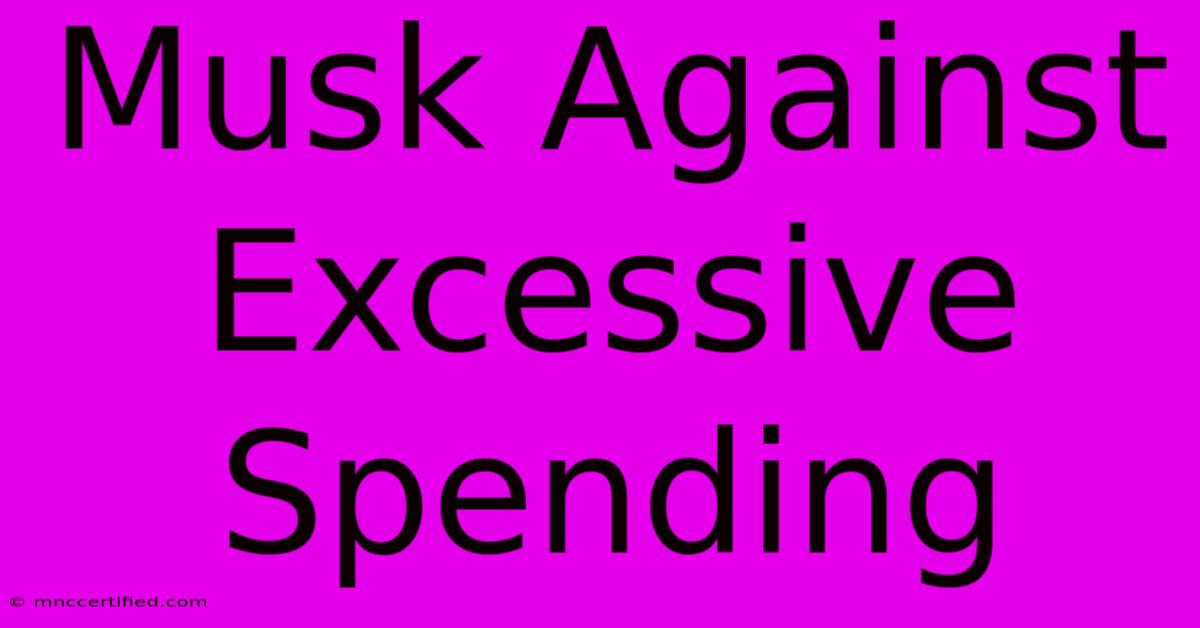Musk Against Excessive Spending

Table of Contents
Musk Against Excessive Spending: A Lean Approach to Success
Elon Musk's reputation precedes him. Known for his ambitious ventures in space exploration, electric vehicles, and artificial intelligence, he's also renowned for his frugal approach to business and a staunch opposition to excessive spending. This article delves into Musk's philosophy on fiscal responsibility, examining its impact on his companies and offering insights for businesses of all sizes.
The Philosophy Behind Musk's Frugality
Musk's aversion to wasteful spending isn't simply a personal quirk; it's a core tenet of his business strategy. He consistently emphasizes efficiency and resource optimization, believing that unnecessary expenses hinder innovation and growth. This philosophy is rooted in several key principles:
-
Prioritization of Core Goals: Musk relentlessly focuses on achieving specific, ambitious goals. This laser focus minimizes distractions and ensures resources are allocated strategically, eliminating wasteful spending on projects that don't directly contribute to the overarching vision.
-
Data-Driven Decision Making: Musk relies heavily on data analysis to inform his decisions, ensuring that investments are justified and yield measurable returns. This approach minimizes the risk of impulsive spending and promotes accountability.
-
A Culture of Cost Consciousness: Within his companies, Musk cultivates a culture that values frugality and resourcefulness. Employees are encouraged to identify and eliminate inefficiencies, fostering a mindset of continuous improvement and cost reduction.
-
Long-Term Vision over Short-Term Gains: Musk is known for his long-term perspective, prioritizing sustainable growth over short-term profits. This approach allows for strategic investments in research and development, even if it means foregoing immediate financial gains.
Examples of Musk's Cost-Cutting Measures
Musk's commitment to fiscal responsibility is evident in numerous instances across his various companies:
-
Tesla's streamlined production processes: Tesla has relentlessly pursued efficiency in manufacturing, implementing innovative production techniques to reduce costs and improve output. This includes automation and the optimization of supply chains.
-
SpaceX's reusable rockets: SpaceX's development of reusable rockets significantly reduces the cost of space travel, a testament to Musk's focus on resourcefulness and innovation. This approach contrasts sharply with the traditional, expensive model of disposable rockets.
-
Emphasis on internal development: Rather than outsourcing extensively, Musk often prioritizes internal development and engineering, leading to greater control over costs and intellectual property.
Lessons for Businesses of All Sizes
Musk's approach offers valuable lessons for businesses of all sizes:
-
Strategic Budgeting: Develop a detailed budget that aligns with your core goals and prioritizes essential expenditures.
-
Continuous Improvement: Regularly assess your processes to identify areas for improvement and cost reduction.
-
Data-Driven Decisions: Use data to inform your decisions, ensuring that investments are justified and yield measurable results.
-
Cultivate a Culture of Efficiency: Encourage employees to identify and eliminate inefficiencies.
-
Long-Term Vision: Focus on sustainable growth rather than short-term profits.
Conclusion: The Power of Fiscal Responsibility
Elon Musk's approach to spending isn't about penny-pinching; it's about strategic resource allocation and a commitment to long-term success. By prioritizing efficiency, data-driven decision making, and a culture of cost consciousness, he has built highly successful companies that are reshaping industries. His philosophy serves as a powerful example for businesses of all sizes seeking to achieve sustainable growth and long-term profitability. Embracing fiscal responsibility isn't just good business; it's a crucial ingredient for success in today's competitive landscape.
Keywords: Elon Musk, cost-cutting, frugal, efficient, resource optimization, business strategy, Tesla, SpaceX, budgeting, data-driven decisions, sustainable growth, long-term vision, cost consciousness, fiscal responsibility, lean business model.

Thank you for visiting our website wich cover about Musk Against Excessive Spending. We hope the information provided has been useful to you. Feel free to contact us if you have any questions or need further assistance. See you next time and dont miss to bookmark.
Featured Posts
-
Trump Taps Walker For Bahamas Post
Dec 19, 2024
-
Trumps Ambassador Pick Herschel Walker
Dec 19, 2024
-
Real Madrid Defeats Pachuca
Dec 19, 2024
-
Schwarzeneggers Santa New Movie
Dec 19, 2024
-
Rnli Warning After Thames Dog Rescue
Dec 19, 2024